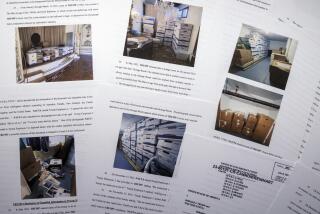Judge Criticizes Prosecutors for Holding Evidence
- Share via
DETROIT — A federal judge sharply criticized prosecutors Friday for failing to give defense lawyers critical evidence that could have helped members of an alleged “sleeper cell” who were convicted in the first terrorism case to go to trial since the Sept. 11 attacks.
U.S. District Judge Gerald E. Rosen had planned to sentence two of the convicted terrorists next week but instead held an emergency hearing Friday to examine why prosecutors did not turn over a letter written in December 2001, accusing a key government witness of lying in the case.
Defense attorneys are seeking to have the convictions reversed, charging that prosecutors “engaged in a persistent and pervasive pattern of misconduct.”
Rosen declined to automatically throw out the convictions, saying instead that he had “some difficult decisions to make” about whether a new trial should be held.
“This is a fine kettle of fish,” Rosen said. “I think I can say this is the most unpleasant task I have had as 14 years as a judge. It is going to call on me to make determinations about the veracity of lawyers I have great respect for.”
He ordered prosecutors and the FBI to review all documents used in the two-month trial in an effort to determine whether the failure was an isolated incident.
The judge also asked the Justice Department to grant immunity to the author of the letter, an imprisoned gang leader who claimed that government witness Youssef Hmimssa fabricated part of his testimony during the trial.
Hmimssa lived for a short time with some of the defendants in the case. He testified that the men were extremists who wanted to help in attacks against the United States and smuggle sympathizers into the country.
The convicted gang leader, Milton “Butch” Jones, refused to testify Friday, instead invoking the 5th Amendment on the advice of his lawyer.
But Hmimssa took the stand and vigorously denied that he ever discussed his case with Jones. The men had adjoining cells in a temporary holding facility for defendants facing trial, but Hmimssa said “we played chess.”
“I told him I am not supposed to talk about my case,” Hmimssa testified. He said his lawyers told him that other inmates would try to use information from him to get out of prison. Hmimssa, who was facing federal fraud charges, pleaded guilty to credit card fraud and possessing phony documents.
The judge closely questioned members of the U.S. attorney’s office in Detroit, who told conflicting stories.
Several government lawyers said an order was given to turn the letter over to the defense team. But the two prosecutors who tried the case contended the order never was transmitted to them.
In a particularly sharp exchange, the judge chastised Keith E. Corbett, who helped present the government’s evidence to the jury during the trial.
“I have no recollection of having seen the letter,” Corbett said. He told the judge that if he had received an order to turn it over to defense lawyers, he would have carried it out at once.
Corbett and other prosecutors said that considering Jones’ criminal record, they believed the letter could not have been used to impeach Hmimssa’s credibility.
But the judge and defense lawyers said the letter at a minimum could have been used as a basis for further investigations, especially since Jones said he kept notes of his conversations with Hmimssa. Rosen said it was the function of a judge to decide whether documents in doubt that could possibly be used to impeach a witness should be given to the defense.
“Hindsight is 20-20,” Corbett later told the judge. “Yes, we should’ve given the document to the court.”
In June, a jury found defendants Abdel-Ilah Elmardoudi and Karim Koubriti guilty of conspiring to provide material support for terrorism and document fraud. The jurors convicted another defendant of fraud but acquitted him of the terrorism charges. A fourth defendant was acquitted altogether.
Defense lawyers first learned of Jones’ letter in November, well after the trial ended.
Jones has a long criminal history. He was incarcerated for 10 years for running a violent drug gang, and in January 2001, indicted in a cocaine case involving three murders. In November, with the sentencing then scheduled for the following month, the Justice Department turned over the letter to the defense, saying it was doing so “in an abundance of caution.”
On Friday, ordering prosecutors and the FBI to comb through all government files in the case, Rosen said: “I don’t want any more surprises. I want to get to the bottom of this. I don’t want this done by a thousand cuts.”
More to Read
Sign up for Essential California
The most important California stories and recommendations in your inbox every morning.
You may occasionally receive promotional content from the Los Angeles Times.













